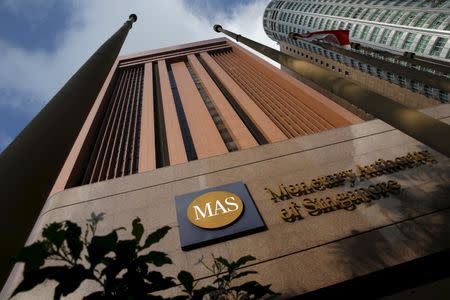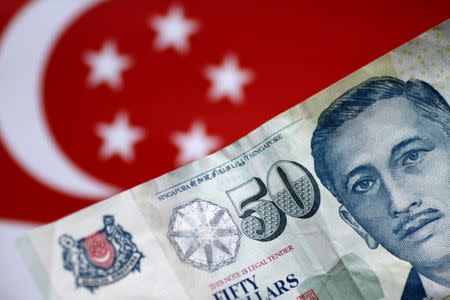Singapore central bank's first tightening in six years comes with trade warning
By Masayuki Kitano and Aradhana Aravindan
SINGAPORE (Reuters) - Singapore's central bank tightened monetary policy for the first time in six years on Friday, saying the city-state's economy is expected to continue growing steadily even as it acknowledged risks from a trade spat between the United States and China.
The Monetary Authority of Singapore (MAS) said it would slightly increase the slope of the Singapore dollar's policy band from zero percent previously, while keeping the width and mid-point of the band unchanged.
"The measured adjustment to the policy stance takes into account the uncertainty in macroeconomic outcomes presented by ongoing trade tensions," the central bank said.
The policy tightening was in line with expectations, and came as official data showed the city-state's economy expanded 4.3 percent in the first quarter from a year earlier, matching market expectations and the fastest pace since a near four-year high of 5.5 percent in the third quarter of last year.
The return of global growth in recent years has prompted some Asian central banks to follow in the footsteps of the U.S. Federal Reserve in gradually shifting away from extremely accommodative monetary settings.
They include Malaysia's central bank, which tightened policy in January and the Bank of Korea, which raised interest rates in November.
The MAS's tightening takes it away from a "neutral" stance adopted two years ago, a setting it has resorted to in the past when the global economy deteriorated, including an 18-month period from October 2008 during the global financial crisis.
The Singapore dollar briefly rose by as much as 0.3 percent after the policy decision, but quickly pared its gains. It was last steady on the day at S$1.3119 per U.S. dollar.
With the U.S.-China trade dispute posing risks to Singapore's trade-reliant economy, some analysts were sceptical the MAS would tighten again at its next decision in October. One even said the latest tightening could be reversed going forward if risks materialise.
"I don't think there will be a further tightening in October... As of now, they are being cautious and not overly wanting the Singapore dollar to appreciate," said Francis Tan, an economist for United Overseas Bank.
The central bank added that Singapore's economy should continue on a steady expansion path in 2018, but also pointed to potential risks from a U.S.-China trade rift.
"An escalation of the U.S.-China trade dispute remains possible, and if it occurs, will have significant consequences for global trade," the MAS said.
The world's two largest economies have threatened each other with tens of billions of dollars' worth of tariffs in recent weeks, spurring worries of a full-scale trade war that could damage global growth and roil markets.
Although the MAS did not give a specific figure, analysts said the Singapore dollar's policy band was probably increased to a modest annual appreciation rate of 0.5 percent.
"We were surprised the MAS would tighten so soon given what is going on in the world," said Sue Trinh, Head of Asia FX Strategy for RBC Capital Markets in Hong Kong.
"If the trade war turns nasty, the MAS may find itself quickly reversing its modest tightening stance," Trinh said.
The MAS said Singapore's 2018 GDP growth should come in slightly above the middle of the official forecast range of 1.5-3.5 percent.
Core inflation should come in within the upper half of the MAS forecast range of 1-2 percent in 2018, while headline all-items inflation is projected to be in the upper half of the 0-1 percent range for the whole of 2018, the central bank added.
The MAS manages monetary policy through exchange rate settings, rather than interest rates, letting the Singapore dollar rise or fall against the currencies of its main trading partners within in an undisclosed policy band.
Twelve of 19 analysts in a Reuters survey had predicted the MAS would tighten monetary policy this month, with the remaining seven expecting policy to be kept unchanged.
(Reporting by Masayuki Kitano and Aradhana Aravindan; Additional reporting by Anshuman Daga, Fathin Ungku and Dewey Sim; Editing by Sam Holmes)

 Yahoo Finance
Yahoo Finance 

